profile badges
recent achievements

Check Out My Favorites
Add 5 games to your Favorites list.
Add 5 games to your Favorites list.

My First Favorite!
Add a game to your list of Favorites by clicking the "Favorite" button on a game page.
Add a game to your list of Favorites by clicking the "Favorite" button on a game page.

Participated in a Tournament at Gen Con
Participate in a tournament at Gen Con. List of participating publishers »>
Participate in a tournament at Gen Con. List of participating publishers »>

Follower
Follow another gamer by clicking "Follow" after reading a review or viewing their profile.
Follow another gamer by clicking "Follow" after reading a review or viewing their profile.
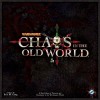


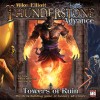




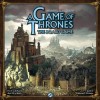
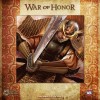
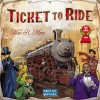
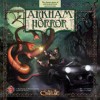

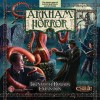
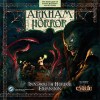
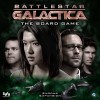
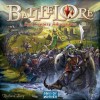

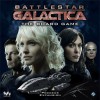

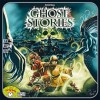

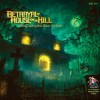
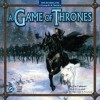
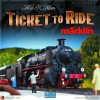

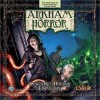
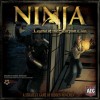


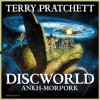



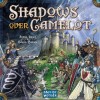


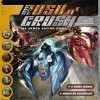

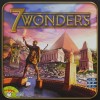
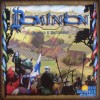

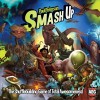

7 Wonders
This is an abridged version of my original review on Pretty Sneaky, Sis. To see the original post in all of it’s posty glory, go to http://clevergamereference.wordpress.com/2012/06/26/wonder-septuplet-powers-activate/
7 Wonders is a game I picked up based on the hype surrounding it. It was all the rage over on BGG for a while, which more often than not is a reliable barometer for the quality of a game. Though I feel that should come with a disclaimer, in that if you don’t like certain types of games, even the best will fail to impress you. I have a friend who doesn’t like Battlestar Galactica (which in my opinion is an utterly ridiculous concept) because he doesn’t like games with a traitor mechanic. First-person shooter games are very popular among many video gamers and I can’t stand them. Modern Warfare, Call of Duty, all these games that get crazy good reviews? I wouldn’t touch ‘em. (Not even with a link) To each their own, but I digress.
Each player is assigned a Wonder tile at random at the beginning of the game (such as The Hanging Gardens of Babylon, The Colossus of Rhodes and the Great Pyramid of Giza). They are all unique and double-sided with different abilities. Ostensibly, this is to vary gameplay or difficulty (expanding replayability), but I haven’t played enough to really confirm this. Each of the Wonders also has some special “ability” that manifests as either bonus points or the ability to acquire more advancements at no cost, etc. I haven’t played it enough to determine if I feel they are balanced or if some Wonders are strictly better than others.
Game play is separated into three phases called Ages. Each Age has its own deck of cards. During each age, each player is dealt 7 cards from the deck appropriate to the age. Each player will then select a card that they will play and pass the remaining cards to the player next to them (clockwise or counterclockwise pending what Age it is). Just in case there is someone here unfamiliar with this concept (and I question what you are doing reading this blog) this is called Drafting. Drafting continues until each player only has two cards left, where they choose one to play and the other is discarded. This marks the end of the Age. Cards drafted will generate various resources and some of them lead to higher scoring combinations. There are a number of different scoring mechanics, but only Military accrues points at the end of every Age, while the rest tally up at the end. The winner is the player who has accrued the most points at the end of the game. Shocker. I wonder how much more difficult and/or interesting it would make the game if it pulled an Abandon Ship and rewarded 2nd place as the winner.
I feel 7 Wonders earned most of the hype it’s been given. It’s a great game for a number of reasons.
1) Aesthetically speaking, the game is gorgeous. The art on the cards and the Wonders themselves is top notch. It’s always nice to have something pretty to look at in a game, and it does make an impact. There have been solid games before that didn’t do as well as they could because people just didn’t like the way it looked.
2) Drafting as a game genre is interesting. I’ve been in booster drafts for various CCGs like Legend of the Five Rings and Magic: The Gathering but in those scenarios it’s different because you’re trying to pull what is strongest for you with a lesser focus on denying the other players good cards (called “hate drafting”). You’re also creating a deck to play a game there. In this, the drafting *is* the game, so paying attention to what you are passing down the line is a lot more important. To the best of my knowledge, 7 Wonders is unique in using drafting as a game mechanic, and I won’t be surprised if it catches fire in the way that Dominion did for the deckbuilding genre. There is a fair amount of strategic depth to the game in that the complexity rises in each passing Age.
3) It can support SEVEN people without really changing the length of the game dramatically. How often can you say that a game plays approximately the same speed with 3 as it does 7? That’s strictly a question of time though. The game plays a lot differently pending the number of players you have. Most of your interactions will be with the two players next to you, but in games with fewer players, you will have more opportunities to draw from your original hand, where with larger games, you are only ever going to get one opportunity to draw from any given hand.
4) Not a one trick pony! By its very nature, it can’t be. There are multiple routes to scoring, and many of them don’t particularly play well together. You can try to be a jack-of-all-trades, but I don’t think you’d be successful. Between the various methods of scoring (which even vary within themselves – easier point strategies yield smaller rewards, more complex ones are harder to pull off but with greater reward) you can go after different strategies and do pretty well with it.
As I’ve said before though, no game is perfect, this one has a couple foibles, neither of which are dealbreakers in my estimation.
After playing the game, thinking about the cards and the various strategies/point scoring methods, I suspect that a lot of games will work out the same in terms of what decisions you’re making, with the largest impact to strategy coming from how many players are in the game. I could be wrong though, and I want to put in a lot more games before I officially stamp this as a foible. Right now, we’ll just label it a concern.
The game is big. As in not table friendly. The cards are oversized and due to a lot of handling and shuffling will likely require sleeves, so you’ll want special sized sleeves. Mayday Games is a good place to look for them. Each player will have a fair number of these oversized cards in front of them and it eats table space really fast. This can be mitigated somewhat with some clever stacking, but it’s important for your neighbors to see what you have in play. The more you play and become familiar with the cards, the more you’ll be able to condense the required space, but even at its most efficient Tetrising, it’s going to take up a fair amount of space.
Lastly, for a game that’s pretty easy, it took a lot to get me through those first two games. Admittedly, the first teaching was just terrible, and the second was a little complex too, but it might just be a tricky game to explain. Once we played a game of it, I got it just fine.
In the end, I like 7 Wonders a lot. It’s a wonder-ful (see what I did there?) game that doesn’t take much time to play, so you can fit multiple games in a single night. This is my first experience with Antoine Bauza, the designer of the game. I also own Ghost Stories but haven’t tried it yet. Might have to change that.